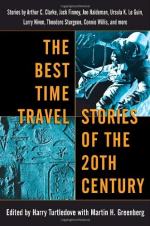|
This section contains 6,546 words (approx. 22 pages at 300 words per page) |

|
SOURCE: Tschachler, Heinz. “‘How to Walk with My People’: Ursula K. Le Guin's Futuristic Frontier Mythology.” Western American Literature 33, no. 3 (fall 1998): 254-72.
In the following essay, Tschachler regards the four novellas of Four Ways to Forgiveness as statements on the evolution in American literature toward reconsideration of American values and conditions.
Toward the end of the third novella in Ursula K. Le Guin's Four Ways to Forgiveness (1995) conflict is resolved once the hero has learned “‘[h]ow to walk. … How to walk with [his] people’” (144). Who are those people? Are they simply the inhabitants of a science fiction world too remote to be of real concern to us worldlings? To say so would surely be too simplistic, for, as Le Guin has remarked, “The future, in [science] fiction, is a metaphor” (“Introduction” 159). And as Larry McCaffery has compellingly argued, the capacity of contemporary science fiction is precisely “to...
|
This section contains 6,546 words (approx. 22 pages at 300 words per page) |

|


